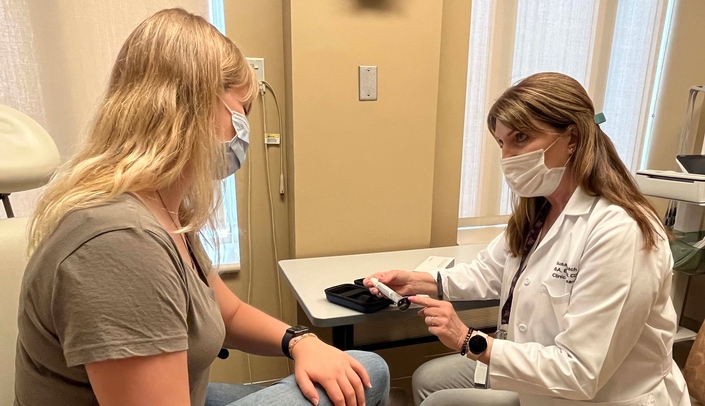The Diabetes Care Foundation of Nebraska has pledged $7 million to the University of Nebraska Foundation to support the launch of a statewide diabetes care and education program led by UNMC and its primary clinical partner, Nebraska Medicine.
Called "On Track: Transforming Rural Diabetes Care and Education," the program aims to lower the state’s rate of uncontrolled diabetes cases and to reduce the rate of diabetes progression among those who are prediabetic, especially in rural communities.
Heart attack, stroke, kidney failure, blindness, amputation, premature death and disability are just a few of the results of uncontrolled type 1 and type 2 diabetes. According to the American Diabetes Association, each year more than 13,500 Nebraskans are diagnosed with diabetes, and more than 520,000 have prediabetes. In the United States, more than 37 million people have diabetes and 96 million adults — more than a third — have prediabetes, according to the Centers for Disease Control and Prevention.
With the support from the Diabetes Care Foundation, $5 million will provide expendable support toward the initial phases of the diabetes program, and $2 million will create a permanent endowment known as the Dr. Timothy Wahl Presidential Chair in Diabetes Education, Care and Research Fund.
The Wahl Presidential Chair will help the UNMC College of Medicine to recruit a leader to drive diabetes education and care while advancing innovative approaches to producing better outcomes for those who are diabetic or prediabetic.
"Tapping our success with other community-based programs and our expertise in several areas, we will significantly improve outcomes for people with diabetes and ultimately prevent its progression and debilitating effects," said UNMC Chancellor Jeffrey P. Gold, MD. "We are extremely thankful for the generosity of the Diabetes Care Foundation and for its partnership in this effort and are pleased to recognize Dr. Timothy Wahl’s own dedication to diabetes care and education with the Dr. Timothy Wahl Presidential Chair."
Tim Wahl, MD, is a longtime practicing endocrinologist in Omaha, who serves on the Diabetes Care Foundation board of directors. He is a graduate of the UNMC College of Medicine and a trustee of the University of Nebraska Foundation.
"The Diabetes Care Foundation is delighted to recognize Dr. Wahl’s lifelong commitment to advancement in care for diabetics and his unwavering belief that putting the patient at the center of that care was of the utmost importance," said Diabetes Care Foundation Board Member Jim Greisch on behalf of its entire board of directors.
Dr. Wahl said no other chronic medical condition requires more patient education and input than diabetes mellitus.
"I am thankful to the Diabetes Care Foundation for funding a chair in my name and to the University of Nebraska Medical Center for implementing the 'On Track: Transforming Rural Diabetes Care and Education' project to help the diabetes population in Nebraska," Dr. Wahl said. "Both initiatives will go a long way to improve the care and education of the diabetic individual. I am honored to have my name associated with this endeavor."
"On Track: Transforming Rural Diabetes Care and Education" will use a centralized, patient-centered hub of expertise to create customized diabetes care strategies across Nebraska communities. This hub will be the program’s hallmark in creating a holistic approach to diabetes care at UNMC and Nebraska Medicine.
The approach emphasizes collaboration across health care, public health and other community organizations on evidence-based engagement strategies and data-driven decision making that leads to long-term, sustainable efforts to improve diabetes outcomes.
Cyrus Desouza, MBBS, and David Dzewaltowski, PhD, are principal investigators for the diabetes program and will help oversee efforts to start it.
"This funding is critical in allowing us to partner with local communities in identifying barriers and gaps to diabetes care and access to resources," said Dr. Desouza, an endocrinologist and chief of the UNMC Department of Internal Medicine Division of Diabetes, Endocrine and Metabolism. "The hub will support information sharing and learning across multidisciplinary teams to improve the lives of those with diabetes."
"Every community is unique, and this novel approach focuses on enabling cross-community collaboration and decision-making that supports tailoring interventions to best meet the community’s needs and to empower individuals to take care of their health," said Dr. Dzewaltowski, professor and community chair for nutrition, physical activity and obesity at the UNMC College of Public Health.
An initial, two-year pilot program will include two rural communities in Nebraska and a focus on individuals with prediabetes or type 2 diabetes. It will facilitate partnerships with local health professionals and advocates while leveraging local resources and technology to bring specialty care to rural locations. The outcome of the pilot program will help determine the feasibility of expanding it to other communities.
An important goal of the program’s community-based support is to help people make the lifestyle changes they need to stay healthy while addressing the various personal, social and economic factors that could stand in their way.
UNMC, Nebraska Medicine and the University of Nebraska Foundation are partnering to secure additional private and public funding needed throughout the various phases of developing the diabetes program.
